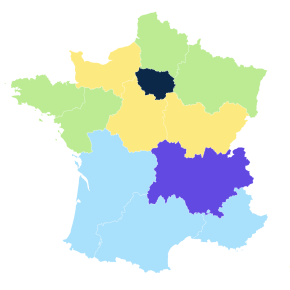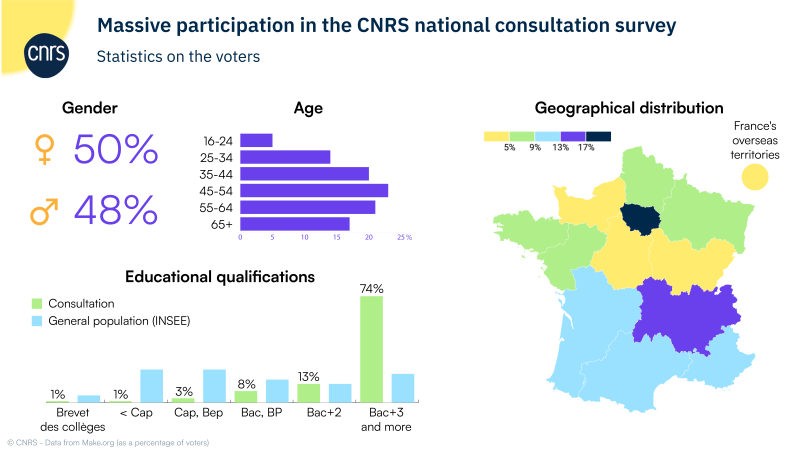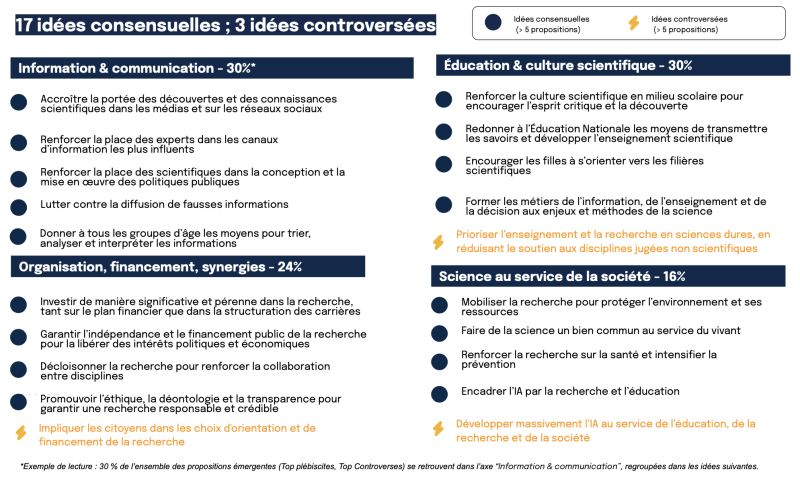A national survey of French people's interest in science
The national consultation carried out by the CNRS on the Make.org platform reveals the priorities of the French people. Over 620,000 votes were cast with 3200 proposals put forward.
"The CNRS has reinforced its capacity to listen to society with this initiative, which is rare in the scientific world," explains Antoine Petit, the Chairman and CEO of the CNRS referring to the national consultation run from November 28th 2024 to January 31st 2025 in partnership with the Make.org citizen engagement platform. The survey was based on a single question - "How can science help us construct the world of tomorrow?"
"This consultation was of great interest to the public", says Axel Dauchez, the founder of Make.org, noting a "very high" participation rate. It attracted over 3200 proposals and 620,000 votes - six times the initial target which was exceeded in just a week. "The results are representative in terms of gender, age and distribution across the country", he explains. The most noteworthy feature of these responses is the very strong over-representation of people with 3 or more years of higher education. These made up 74% of participants which Mr Dauchez calls a "classic bias in this type of consultation and even more so online with a subject of this kind".
Antoine Petit explains that this massive participation "testifies to French people's interest in science, their conviction that it's useful for society and their attachment to public research". This is indeed the message that emerges from the proposals made. Make.org grouped the proposals into 17 consensual ideas and 3 controversial ideas and classified them into 4 themes (see box for methodology).
The most consensual ideas to emerge from the consultation can be divided into two main areas. First is the importance of knowledge in constructing the world of tomorrow which is thought to require a more widespread dissemination of knowledge and scientific culture. This aspect accounted for the majority (60%) of the proposals made in the analysis. There was particularly strong support for reinforcing the role of scientists in the decision-making process and the media which is viewed as essential. Similarly, the aim of combating misinformation was expressed through the consensus for training the younger generation in science, scientific culture and critical thinking as well as students in information, teaching and public decision-making professions.
The second area involves a certain vision of research with ideas about the organisation and priorities of public research which effectively services society. Here, decompartmentalisation and dialogue between the sciences are seen as key factors. Over one in 5 (24%) of the proposals made concerned the organisation of ambitious and independent public research. A clear desire was expressed for funding and the right conditions for research to be carried out to make sure research is sustainable, effective and responsible. Antoine Petit explains that "the French support research that is adequately funded to ensure its sustainability and attractiveness to the most talented scientists and whose relevance is based on decompartmentalisation and collaboration between disciplines. This is the CNRS model which we are committed to defending".
As Axel Dauchez observes, "some ideas do probably come from the higher education and research world and these relevant and well-written proposals did attract many votes. But we're confident that the votes come from a broader audience beyond that sphere, particularly thanks to the communication campaign run on social networks".
In this second area, around one proposal in 6 (16%) also specified priority themes that need to be explored. The respondents consider that public research needs to focus on three societal issues in particular and these are indeed among the CNRS's strategic priorities - the fight to preserve the environment and its resources, improving health in general and human health in particular and the proper management of artificial intelligence.
"The results of this consultation confirm the CNRS's 'raison d'être', uniqueness and ambition to bring all the sciences together in synergy to respond to the challenges facing society and work actively to share knowledge", remarks Antoine Petit. "Given that the current geopolitical context is complicated, uncertain and menacing for science, they urge the CNRS to strongly reaffirm this ambition and step up its efforts to disseminate knowledge and scientific culture."
A tried and tested methodology
The Make.org teams used the results of the votes to identify the ideas voted for by the citizen respondents who took part in the national consultation. They focused in particular on best voted proposals. Similar proposals were grouped together as an 'idea'. Axel Dauchez explains that "overall the national consultation carried out by the CNRS was not particularly controversial. We were able to identify 17 popular ideas and 3 controversial ideas among the 3224 proposals submitted by the French".


